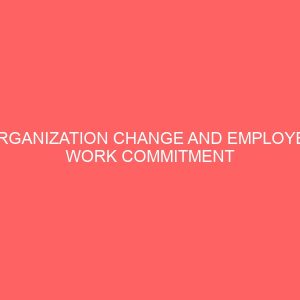Description
CHAPTER ONE
INTRODUCTION
1.1 Background to the Study
An organizational strength could be improved teaming works for effective performance. The development of human resources has spanned through some period of time in history. It began with the process of transforming skills and knowledge to younger generation through apprenticeship.
Today the transfer process has become broader and more sophisticated; this is because of the completion and dynamic environment where increase in technological advancement is. Therefore, as the environment especially business environment changes with people present in such environment have to change with it in order to move the pace of the responsibility of training and developing their workforce so that they can fit the jobs they are given in order to perform efficiently.
One of the ways by which an organization responds to change is manpower training, training in most cooperate organizations not only in this but other profit and non profit. By manpower, we refer to the human resources of an organization. It refers to the totality of workforce or employees regardless of their classification or designation. In a broader sense, an organizational manpower encompasses the skills, energies, knowledge and talent available in the organization including the individual goals. Training constitutes a major aspect of the job performance of any worker as it affects the way they behave and perform their job in the organization. The process of training in an organization is a continuous one and organizational money spent on the training of the worker is money well invested. Workers, who have not received adequate training before being assigned with responsibility, lack the necessary confidence with which to carry out their job. Worker should be helped to grow by systematic training. Job training can bring about confidence and enthusiasm among workers, people are trained to have confidence and improve their level of performance of the job. Both the federal and state government recognized the importance of training in the development of the nation and the entire workforce.
Therefore, efforts have been make to raise the standard in the country, some of these efforts include expansion of facilities in higher institution like college of education, Polytechnics and Universities for training of both senior and middle level management. Establishment of Nigeria Council of Management and Administrative Staff College of Nigeria (CASCON) established in 1971, 1972 and 1913 respectively. There are also appreciable effort on the part of cooperate bodies such as Nigeria Institute of Management (NIM), Center for Management Development and the Administrative Staff College where provided facilities for training.
1.2 Statement of Research Problem
The significant aspect of human resources in any organization cannot be overemphasized. They constitute a basic element in meeting and attaining the goal or success of the organization. They are the pivot on which an organization revolves. Modern day organizations are now becoming complex as a result of technological advancement that have resulted to changes in the organization. The dynamic nature of the organization made the manager to always embark in decision and evaluation in order to attain the predetermined goals. In this study, the following problem areas shall be addressed.
(i) To examine the necessity for training in an organization.
(ii) To examine the challenges of staff training.
1.3 Research Questions
1 Does effective training improve worker’s performance?
2 Does staff training contribute to the attainment of corporate objective?
3 Is there any significant difference between the trained and untrained staff in the performance in an organization?







